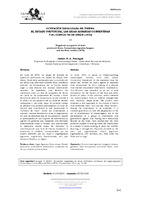Ocupación ilegalizada de tierra : el estado provincial, las ligas agrarias correntinas y el conflicto de Ifràn (1973)
Abstract
En junio de 1973, un grupo de familias de aparceros productores de tabaco del Paraje Ifrán(Goya, Corrientes), amenazados por la expulsión de las tierras que laboraban durante años, acordaron sostener su permanencia por la fuerza, dando lugar a una disputa que alcanzó dimensiones notables. De inmediato, esta decisión fue clasificada como un acto de ocupación de tierra por parte de los propietarios del campo y otros sectores de poder de la provincia; lo que envistió a la acción de los aparceros de un evidente sentido transgresor y, por ende, ilegal. El presente trabajo se propone una primera aproximación al curso de eventos que constituyen lo que denominaré el “conflicto de Ifrán”. Entre las dimensiones a analizar, interesa focalizar en cómo la ilegalización del acto de desobediencia de los aparceros suscitó la participación de un conjunto de instituciones y agentes de gobierno que, habiendo sido definidos históricamente como el Estado, han representado la presencia estatal capaz de viabilizar la intervención de una serie de fuerzas tendientes a solucionar el conflicto, encaminándolo por los cauces previstos por las leyes y organigramas (agencias, organismos, funcionariado, etc.) que hacían al Estado y su lógica.
In June 1973, a group of tobacco-growin sharecropper families from Ifrán (Goya,
Corrientes), threatened by the expulsion from the lands they worked for years, agreed to maintain their permanence by force, leading to a dispute
that reached remarkable dimensions. Immediately, this decision was classified as an act of land occupation, by the owners of the field and other sectors of power in the province; which endowed the sharecroppers with an evident transgressive
and, therefore, illegal sense. The present work proposes a first approach to the course of events that constitute what I will call the "Ifran conflict".
Among the dimensions to be analyzed, it is interesting to focus on how the illegalization of the act of disobedience of sharecroppers led to the
participation of a group of institutions and government agents that, having been historically defined as the State, have represented the state presence capable of making viable the intervention of a series of forces tending to solve the conflict,
directing it through the channels provided by the laws and organizational charts (agencies, organizations, civil servants, etc.) that made the State and its logic.
Collections
The following license files are associated with this item:



